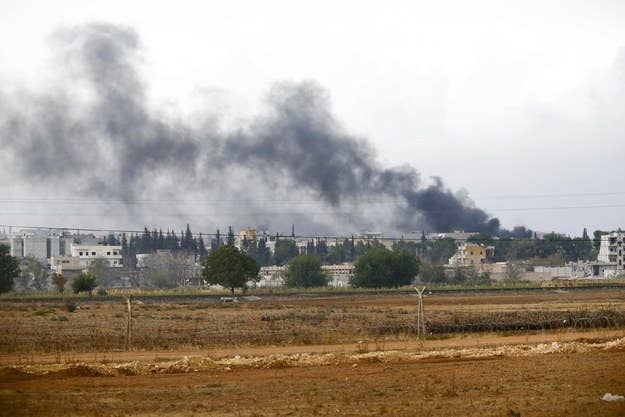
WASHINGTON — The U.S.-led coalition fighting ISIS lacks the intelligence on the militant group to effectively strike them in Iraq and Syria, said U.S. State Department and military officials in Washington.
There is a "serious dearth" in intelligence on the group's leaders, organizational structure, or vulnerabilities, U.S. officials told BuzzFeed News.
"We don't have a great list of targets to hit, we are dealing with a lot of unknowns," said one defense official, who spoke to BuzzFeed News on condition of anonymity. "They don't have that centralized structure that makes them easy to isolate and take out."
He said the U.S. military was currently relying on intelligence coallated from satellite photos and drones to choose targets.
"Without HUMINT there is only so much you can do," he said, referring to "human intelligence" or information gathered on the ground.
The lack of information coming from the ground has made it "much harder for us to be able to know for sure what it is we're hitting, what it is we're killing and what is collateral damage," said Tom Lynch, a retired colonel and former adviser to the Joint Chiefs of Staff to AP this week.
Despite the dearth of reliable intelligence, the U.S. and other countries have increased efforts to share data and reports to maximize their understanding of how the ISIS command structure works and how their expansion across Syria and Iraq could best be stopped. In recent weeks, U.S. airstrikes have hit at ISIS positions around the Kurdish town of Kobani, which straddles the Syrian-Turkish border. Kurdish forces say that ISIS is now in retreat there, and welcome the U.S. airstrikes as a "deciding factor."
Speaking to CNN earlier this week, Rear Adm. John Kirby, the Pentagon's spokesman, said the U.S. airstrikes against ISIS had been particularly affective around Kobani.
"What makes Kobani matter for us from an airstrike perspective is that [ISIS is] there, and that they want it," said Kirby.
"In the beginning not enough was being done, but the Americans got serious about the strikes and then ISIS got serious about leaving," said Kurdish Brigade Commander, Reba al-Sham, who spoke to BuzzFeed News by phone from near Kobani. "The Americans knew what to hit around Kobani, because that information was relayed to them."
That information was being passed through a third-party country, he said, but would not name that country. He added that, "several countries in the region and beyond with shared goals are sharing intelligence on ISIS."
On Tuesday, U.S. and Russian officials announced an agreement to share intelligence on ISIS due to "shared deep concerns" about the group.
"This is going to be a long-term campaign," said President Barack Obama, during a press conference following a meeting between represetnatives of 21 countries that have agreed to fight ISIS. "There are not quick fixes involved. We are still in the early stages. As with any military effort, there will be days of progress and there are going to be periods of setbacks, but our coalition is united behind this long-term effort."
While not part of the immediate coalition, Israeli officials told BuzzFeed News that they are also sharing intelligence on Syria with the U.S., and that they are closely monitoring the movements of ISIS.
"ISIS is a group that threaten this entire region. They have aspiration to only grow their caliphate so it is in the rare shared interest of most countries in our neighborhood to cooperate and share necessary intelligence on ISIS," said one Israeli defense official.
